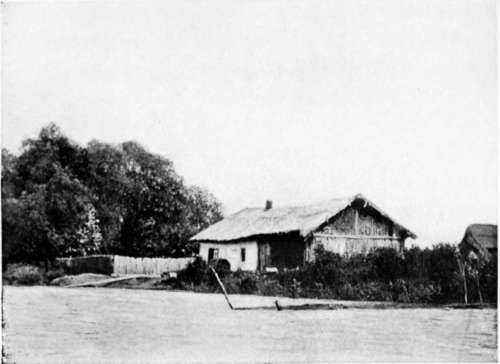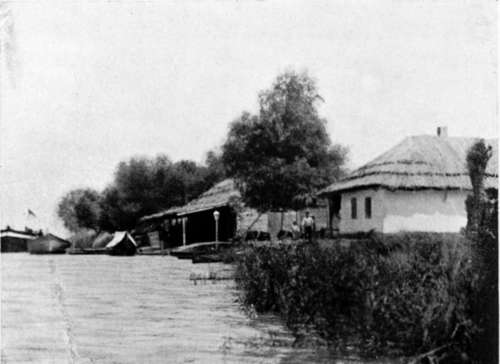Collecting In The Dobrudscha. Part 2
Description
This section is from the book "Bird-Hunting Through Wild Europe", by R. B. Lodge. Also available from Amazon: Bird-Hunting Through Wild Europe.
Collecting In The Dobrudscha. Part 2
These three men were willing and obliging- at least two of them were, the other, a silent yellow man with a Tartar-like cast of face, spoke hardly a word, good or bad, to anybody. He must have come from some far-remote corner of the great Russian Empire, for neither of his compatriots could understand his speech. All that was known of him was that he had been one of the mutineers of the Russian war-ship the Potemkin, in the Black Sea, 2,000 of whom had taken refuge in Roumania, and had settled down there.
At midday we left the Sulina arm and proceeded to the north, along what had formerly been the navigable channel before a short cut had been made across a big bend. Up this channel the men towed the boat against stream-our usual mode of procedure when our course was against the heavy Danube current, which runs with amazing force. You hear about the blue Danube, but never see it; the mud-charged waters of the great river are a dark brown in colour, and must carry into the Black Sea an astonishing amount of sediment held in suspension. The navigable arms forming the Delta-the Kilia, Sulina, and St. George's arms-are only kept to a navigable depth by numerous powerful dredges incessantly at work, clanking and groaning and snorting and puffing enough to frighten all the water-fowl for miles.
Towards evening we arrived at a small fishing-village, and put up at the superintendent's house, the men as usual sleeping in the boat. The mosquitoes in this place were as thick as bees when swarming. Around the houses the people were burning dry reeds to windward, the pungent smoke of which has some effect in lessening the plague, and my first business was to unpack and rig up my mosquito-net. This excited much admiration for the fineness of its texture, the fabric in universal use for the purpose being a thick, close sort of cheese-cloth, which must be very suffocating in the hot nights.


Fish Depots On The Danube
One of the fishermen here was engaged to take me in his lodka (boat) the next day to a Swan's nest which he knew of. The Mute Swan (Cygnus olor) is found here in a wild state, as well as the Wild Goose (Anser cinereus); but both nest early in the year, and by this time both species had hatched their young. In fact, at the house we were staying in they had a brood of young Wild Geese nearly full grown.
This fisherman was a big, bearded, rough-looking Russian, like nine-tenths of the fishermen in this district, and as I was to spend the whole day alone with him it was first necessary, before starting, to give him full instructions to last all day. Accordingly I explained to M. Panaitescu in French what I wanted to do and what he was to do ; he then translated these instructions to one of our Russian boatmen into Roumanian, who again translated into Russian to the fisherman.
After these necessary preliminaries, off we started. For hours we progressed through narrow channels, at times crossing wide lakes covered with huge water-lilies and strange water-ferns without sighting any human being. The only signs of life were the water birds and the mosquitoes. Every few yards a Purple or Grey Heron, so intent on fishing in some secluded corner as to allow the close approach of our boat, would start up and flap off in a hurried and ungainly fashion. On the matted water-lilies curious Night Herons stood, with the air of pensive melancholy characteristic to them, or Squacco Herons would hurry off at our approach to settle farther on and resume feeding.
The moment the sharp, upturned prow of our lodka pushed through the fringe of reeds which concealed some more open pool, squattering flocks of Coots and White-eyed Pochards (Fuligula nyroca) would hasten into the dense growth and be lost to sight.
Presently, at the far side of a large lake we were crossing, we saw a pair of Swans, and my guide cautiously entered the reeds and made signs that we were approaching the nest. The last hundred yards we progressed with the utmost slowness and caution, pulling ourselves forward with our hands ; but the nest when we reached it was empty, and had not been occupied for at least twenty-four hours ; so that my hopes of an automatic photograph of old or young, by leaving the electric camera, were doomed to disappointment.
For some time we hunted about for another nest, but only succeeded in finding one that was submerged under more than a foot of water by a recent flood. The labour now expended in forcing the lodka through the dense reeds which towered over our heads was excessive ; sometimes all our efforts could not move the boat an inch. The heat was terrific ; and shut in as we were by gigantic reeds there seemed to be no air to breathe. We were enveloped by dense clouds of hungry mosquitoes and poisonous flies nearly as big as wasps, which fetched blood at every bite, so that even the bare, horny feet of the fisherman were streaked with blood.
Other insects, too, of a more interesting nature were there in great numbers. I had been asked to keep an eye open for specimens of the larva or pupa of the moth Loelia coenosa, which at one time was to be found in our own Eastern counties, but which is now extinct. Curiously enough, I had seen one larva in Montenegro, but not knowing that it was of any interest had not troubled about it. While struggling in this desolate place I suddenly saw a similar larva on a reed-leaf we had passed. Making signs to the Russian to go back a little it was soon found, and proved to be identical, and I then examined the reeds with more care as we progressed. No more larvae could be seen, but very many elongated whitish cocoons were discovered on the stems of the reeds. I had no evidence that these pupa cocoons any human being. The only signs of life were the water birds and the mosquitoes. Every few yards a Purple or Grey Heron, so intent on fishing in some secluded corner as to allow the close approach of our boat, would start up and flap off in a hurried and ungainly fashion. On the matted water-lilies curious Night Herons stood, with the air of pensive melancholy characteristic to them, or Squacco Herons would hurry off at our approach to settle farther on and resume feeding.
Continue to:
